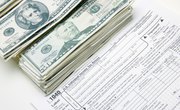When you buy investment real estate like a rental property, the IRS doesn't let you write off the cost of buying it as an expense. Instead, the IRS requires you to gradually write down the property's value through a process known as depreciation. While depreciation can give you valuable yearly write offs, it can also come back as additional tax liability when you sell the property.
Buildings
Residential rental property is deductible over a 27.5 year recovery period. To find your annual depreciation allowance, subtract the value of your land from your property's cost basis, which is its purchase price plus its closing costs. Divide the basis of the building by 27.5. You can write off that amount every year for 27 years, and then take a half deduction in the 28th year.
Improvements
When you improve your rental property, the IRS treats each improvement as a separate depreciable item. You depreciate the improvements over the same 27.5-year life as the original property, but the 27.5-year clock begins when you do the improvement. In other words, it's possible for you to be depreciating improvements to the property after you fully depreciated the property. Repairs, however, don't need to be depreciated. You can claim them as expenses in the year that you complete them.
When You Sell
If you sell your property for more than its depreciated value, the IRS takes back the tax that you would have paid on the amount you depreciated. To do this, it levies a special tax called depreciation recapture tax. The amount of money that is subject to this 25 percent tax depends on your final selling price. If you sell your property for more than its adjusted cost basis, which is its purchase price, closing costs and improvements combined, you will pay the recapture tax on all of the depreciation you claimed. If you sell it for more than its depreciated basis, which is its adjusted cost basis less all of the depreciation you claimed, but less than its adjusted cost basis, you will pay the tax on the difference between the two.
Not Claiming Depreciation
Given that depreciation recapture tax can be a significant expense when you sell your property, it might be tempting to file your taxes without claiming your depreciation allowance. You might think that doing this will make you pay more tax every year but will save you a great deal when you sell the property. Unfortunately, it doesn't work this way. The IRS charges depreciation recapture tax on the depreciation that you were allowed to claim, not on the depreciation that you actually claimed. This means that you'll have to pay recapture tax as if you depreciated the property even if you didn't.
References
- IRS: Publication 946 - How to Depreciate Property
- Bankrate: Figuring Depreciation Recapture
- Inc: How to Calculate Depreciation and Amortization
- Internal Revenue Service (IRS). "Publication 527 (2018) Residential Rental Property: Depreciation of Rental Property." Accessed Jan. 10, 2020.
- Internal Revenue Service (IRS). "Frequently Asked Questions: Property (Basis, Sale of Home, etc.)." Accessed Jan. 10, 2020.
- Internal Revenue Service (IRS). "Frequently Asked Questions: Sales, Trade, Exchanges." Accessed Jan. 10, 2020.
- Cornell Law School Legal Information Institute. "26 U.S. Code § 1250.Gain From Dispositions of Certain Depreciable Realty." Accessed Jan. 10, 2020.
Writer Bio
Steve Lander has been a writer since 1996, with experience in the fields of financial services, real estate and technology. His work has appeared in trade publications such as the "Minnesota Real Estate Journal" and "Minnesota Multi-Housing Association Advocate." Lander holds a Bachelor of Arts in political science from Columbia University.

